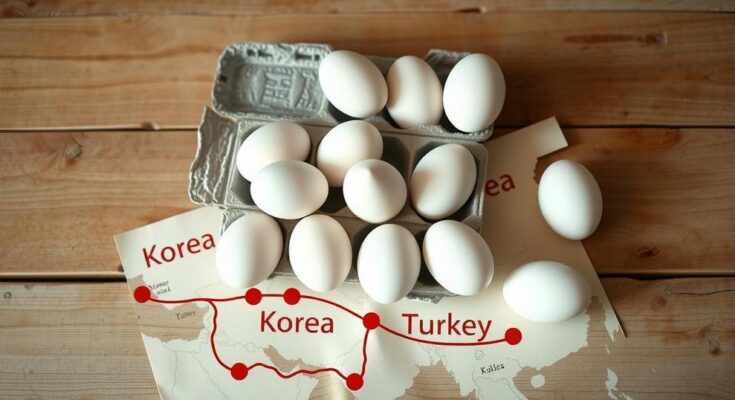The U.S. is importing eggs from Turkey and South Korea to combat rising prices caused by avian flu. Brooke Rollins confirmed discussions with additional countries for temporary imports. The USDA reports a significant decrease in wholesale egg prices, indicating potential relief for consumers. Imports will cease once the domestic poultry supply is restored.
In response to an avian flu-induced supply shortage, the United States has begun importing eggs from Turkey and South Korea, as confirmed by Donald Trump’s former Agriculture Secretary, Brooke Rollins. These imports are a strategic move to alleviate the increasing egg prices that have affected consumers nationwide. Rollins specified that discussions are ongoing with additional countries for temporary egg imports, amounting to hundreds of millions of eggs in the short term.
The surge in egg prices is largely attributed to multiple bird flu outbreaks, leading to the culling of approximately 30 million birds, which has significantly restricted the supply. Egg prices became a prominent issue during the previous presidential election, as Donald Trump sought to leverage public dissatisfaction with rising costs under President Joe Biden’s administration. Following his return to office, Trump instructed Rollins to address the egg supply issue and to encourage a decrease in prices.
Moreover, producers from various countries have expressed interest from the United States about their egg exports. Polish and Lithuanian poultry associations reported that they have been contacted by U.S. diplomatic staff regarding potential egg shipments. “There is a shortage of eggs in many countries,” stated Katarzyna Gawronska, director of Poland’s National Chamber of Poultry and Feed Producers, raising concerns regarding the financial terms offered by the U.S.
The United States Department of Agriculture (USDA) recently reported that wholesale egg prices have decreased by nearly 50 percent since late February, indicating that consumer prices might soon follow suit. In a statement, the USDA emphasized, “The downward trend underscores the effectiveness of USDA’s approach.”
Rollins noted that U.S. egg imports would cease once domestic poultry farmers are able to restore their supply. She indicated that in a couple of months, as chicken populations are replenished and the egg-laying industry resumes regular output, the focus would shift back to sourcing eggs internally for consumer markets.
The United States is taking proactive measures to mitigate the egg supply crisis driven by avian flu outbreaks by importing eggs from Turkey and South Korea. The initiative aims to alleviate rising prices and support domestic production recovery. As wholesale egg prices show signs of decline, authorities anticipate a return to stable supply and pricing in the near future, contingent on the replenishment of U.S. poultry stocks.
Original Source: www.bryantimes.com




